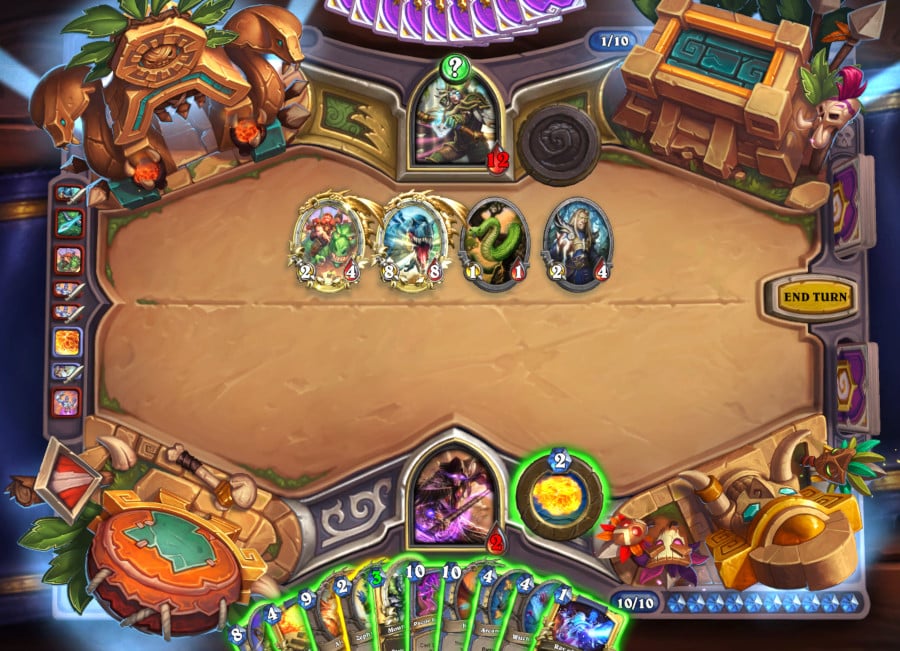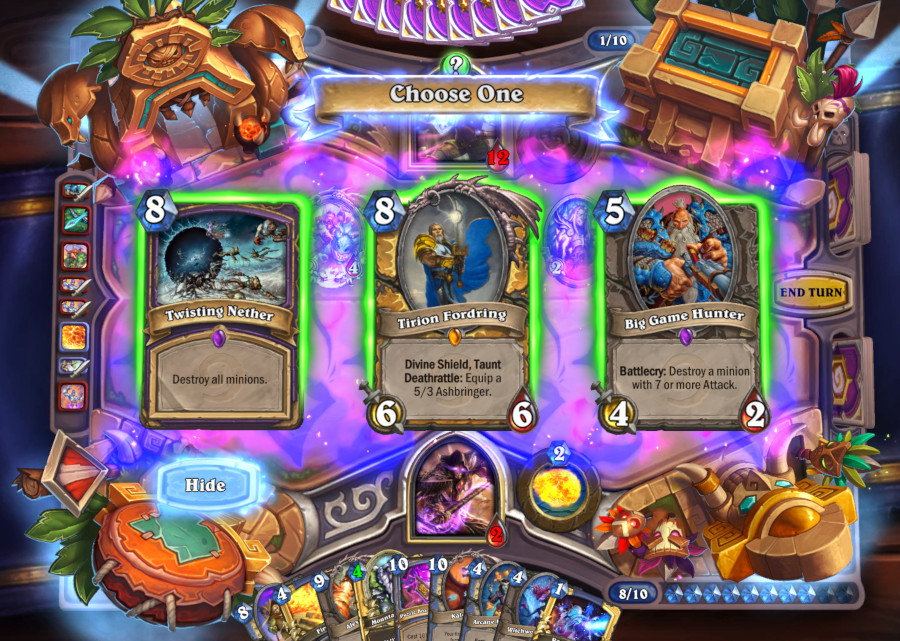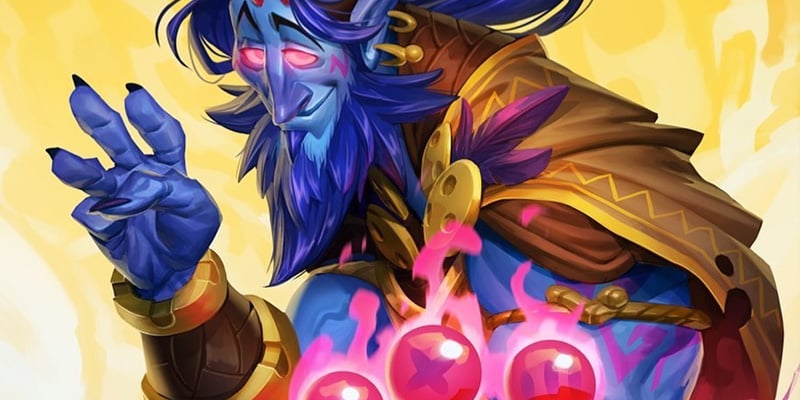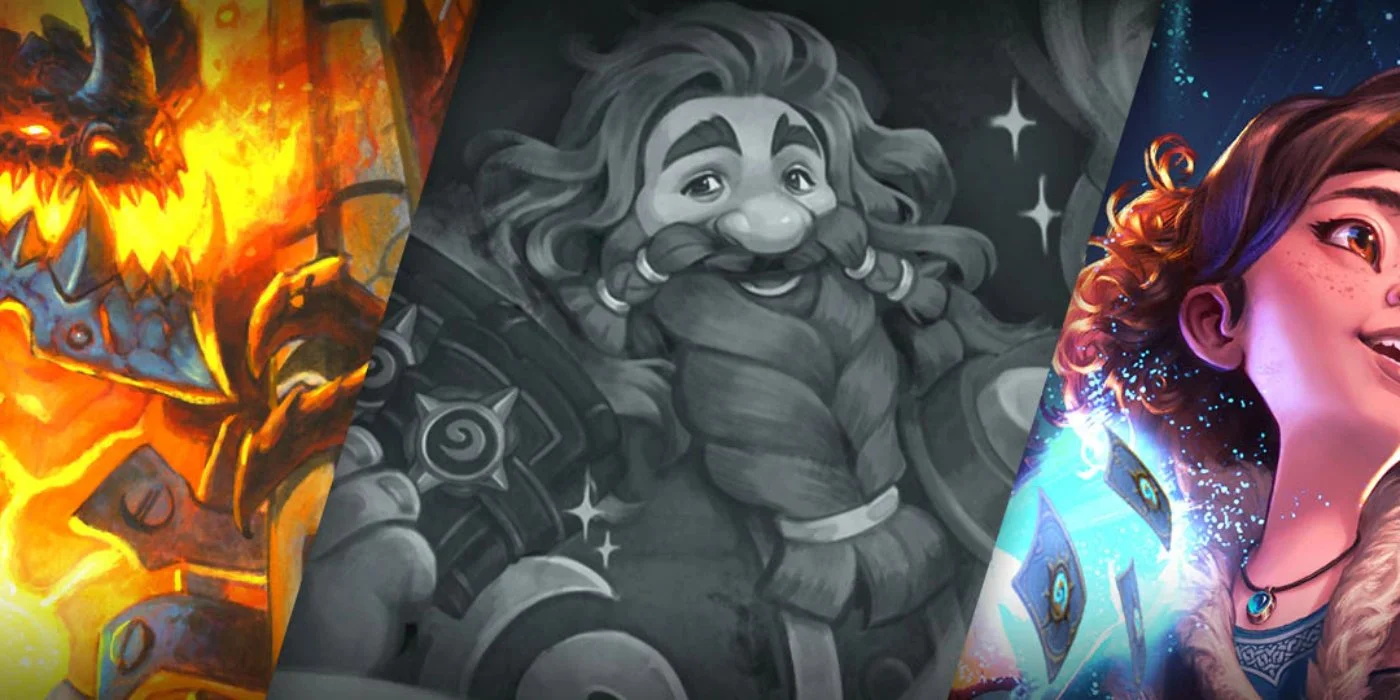The release of Saviors of Uldum brought us one of the most unique cards ever: Zephrys the Great. When you play Zephrys he will give you a choice of 3 cards from the Basic and Classic set and these three choices vary depending on the current game state. It is this catch that makes Zephrys one of the most fun and challenging cards to play.
A Few Provisos
First, let’s establish what Zephrys does and doesn’t understand. Zephrys only looks at public information, meaning he doesn’t know what’s in your hand or your opponent’s hand. He knows the Health and Armor of each player, hand sizes, mana available, and minions on the board. It is also important to remember while Zephrys does know certain keywords of minions on the board (e.g. Rush, Taunt, Windfury, etc), he does not know individual card text. For example, let’s say your opponent has Zilliax on the board and magnetizes two SN1P-SN4Ps onto it. On your turn, you play Zephrys hoping for a Silence or Polymorph and instead, he gives you Big Game Hunter. This is because while Zephrys knows Zilliax has a deathrattle, he doesn’t know exactly what that deathrattle does so he sees Big Game Hunter as the most effective way to deal with it.
There are also some cards Zephrys doesn’t give you because of either limitations in his AI or bugs. As of right now, Zephrys has trouble detecting the durability of weapons and will not offer Bloodsail Corsair. He will instead offer either Harrison Jones or Acidic Swamp Ooze depending on the mana you have available. Zephrys also rarely (if at all) offers Shadow Madness or Blessed Champion.
Note: Chadd Nervig has stated they are looking into fixing these issues. Chadd is usually active in answering questions about Zephrys and you can read them on his Twitter.
What is the Perfect Card?
Since there are a nearly infinite number of possible game states, it’s impossible to cover the perfect card for every scenario. Ultimately, it will be up to you to decide that so you should know all of the Basic and Classic cards. When looking for a specific card off of Zephrys you need to keep in mind the goal of your deck. You don’t want to play Zephrys on turn 10 and get a Twisting Nether if you’re an aggro deck. If you’re a control deck you don’t want to play him on 2 and get Wild Growth, Animal Companion, or Brightwing. Those aren’t advancing the goal of your deck.
Zephrys is great at giving you board clears or lethal, but it’s also important to remember that there are a lot of great value cards in the Basic and Classic set. Soul of the Forest is often a good pick when facing Warrior. There’s also Mind Control Tech, Cabal Shadow Priest, or Power of the Wild. All of these aren’t game-winning cards, but they are often a really good value or tempo play and can help further what your deck is trying to do.
To know what your perfect card is, it’s important to keep in mind these 3 rules:
- Know what your deck is trying to do
- Weigh the options of using Zephrys early or later in the game
- Make sure you know what cards Zephrys CAN and CANNOT give you
Getting the Perfect Card
Now, let’s dive right into the most important question: how can we get the perfect card from Zephrys? Knowing the info above and knowing that Zephrys typically looks for a card you can play on your current turn or your next turn, we can manipulate the game state and mana available to nudge Zephrys in the right direction.
Let’s say you’re playing Mage and you have your opponent down to 12 health. You have 10 mana available and a Fireball and Zephrys in hand. You win the game if you get another Fireball off Zephrys.

But, you make the mistake of playing Zephrys before you cast the Fireball in your hand. Now you’re staring at the Tirion Fordring, Twisting Nether, and Big Game Hunter and wondering why on earth you didn’t get offered a Fireball.

Ordering is important
If you remember, Zephrys does not know what cards you have in your hand, only how many. So, he doesn’t see a 4 mana deal 6 as a good card in this situation. To achieve the outcome you wanted, you should have played the Fireball in hand first before playing Zephrys. This is the kind of mindset you’ll have to adopt if you’re ever looking for a specific card from the “Great” djinni. In most cases, you should play all of your relevant cards first and then play Zephrys once you have the right amount of mana left over.
Value and Tempo
Is it ever correct to play Zephrys for tempo? In some decks, sure! But, if you’re playing Highlander Mage or Highlander Hunter you might want to hold off since the potential value he offers is much greater than getting 3 or 6 damage in the early game. If you put Zephrys in your Murloc Paladin or Aggro Rogue lists then playing a 3/2 on turn 2 isn’t a bad play if you don’t have much else to do, especially if the opponent can’t deal with it efficiently. The important rule here is to have your turns planned out. If the goal of your deck is to "go face" and Zephrys on turn 2 fits that goal, then go for it. Never underestimate a good tempo play.
So far we have covered lethal play, tempo play, and board clear plays. Now it’s time to talk about value plays. There are a lot of cards in the Basic and Classic set that offer a lot of value or tempo, but won’t necessarily win you the game right then and there. Knowing this, it can be hard when deciding whether to play Zephrys early or hold him for that lethal out. Yes, playing Zephrys and winning the game with Bloodlust is a lot of fun, but is it always the right play? The best way to answer that is by asking another question: how do I win the game with the cards in my hand? Hearthstone is a game of resources and since card draw isn’t infinite, your game plan is often dictated by your starting hand. If your starting hand is Zul'jin, Deadly Shot, Marked Shot and Zephrys the Great, then maybe holding onto Zephrys for that sweet lethal play isn’t a good game plan.
What makes Zephrys a truly great card is that he fits into almost every type of game plan. Whether you’re playing a control, aggro, combo, or midrange deck he’s got you covered! So, when trying to master playing this card you have to be flexible and not zeroed in on one scenario. As each turn passes you should be constantly re-evaluating the game state and ask what card is good in that scenario and if that’s worth playing Zephrys.
We have come to the end and now you should have a good grasp on how to play with this unique and fun card. Truly, we ain’t never had a card quite like Zephrys.
What are some of your suggestions for playing Zephrys? Or perhaps you have some fails or game-changing stories to share?

![Cataclysm Card Reveals - Day 14 [Final Reveal Stream]](https://youre.outof.games/media/uploads/a1/2e/a12ecd1b-e409-42b4-a7aa-0f7a742e862f/cataclysm-final-reveal-stream.webp)

![Cataclysm Card Reveals - Day 13 [Finished]](https://youre.outof.games/media/uploads/3c/30/3c305a7f-a6d1-4ef4-8134-b66c724a6d27/cataclysm-day-13-2.webp)
Comments
Thank you for the great guide!! I love this card and this type of design.
One request: If possible please make/keep a section of "fixes" or things Zyphrys learns when they become public. I would love a place to check every so often to see if there has been any changes.